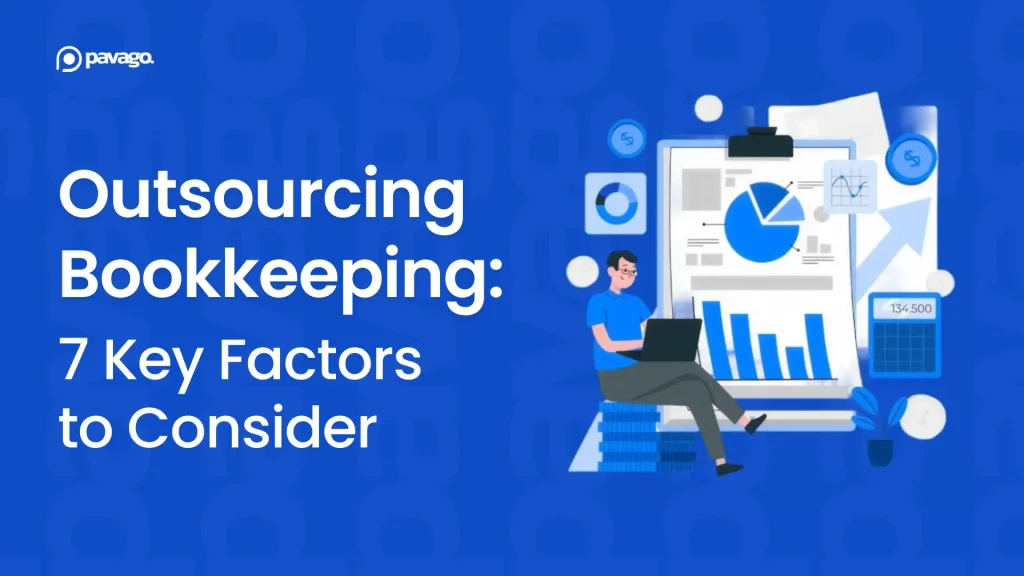Are you feeling the pinch of rising administrative costs and the growing demands on your practice? Or maybe you’re looking for ways to streamline patient care while cutting operational overhead.
Hiring a virtual medical assistant (VMA) is the perfect solution to overcome these challenges.
As the healthcare industry shifts — telemedicine is on the rise, and regulations like HIPAA require strict compliance — healthcare virtual assistants are becoming an integral part of the healthcare team. However, the process of finding the right VMA can be tricky, especially in the highly regulated US healthcare system.
In this blog, I’m going to walk you through the exact steps to hire a virtual medical assistant, what you should look for, and how to ensure they are a seamless fit for your practice. But first, let’s understand how virtual medical assistants (VMAs) are transforming US healthcare.
What is a Virtual Medical Assistant?
A Virtual Medical Assistant (VMA) is a remote professional who provides administrative, clinical, and technical support to healthcare providers, allowing them to focus more on patient care. These assistants work virtually, typically from a remote location, leveraging technology to perform their tasks seamlessly.
Key Roles and Responsibilities of a Virtual Medical Assistant
- Administrative Support: Scheduling appointments, managing calendars, handling patient records, and processing insurance claims.
- Patient Communication: Responding to patient inquiries, sending reminders, and coordinating follow-ups.
- Medical Documentation: Assisting with electronic health records (EHR) management, transcribing medical notes, and maintaining accurate records.
- Billing and Coding: Supporting medical billing processes and ensuring compliance with coding standards.
- Clinical Assistance: Offering telemedicine support, such as preparing reports or assisting with virtual consultations.
Why You Should Consider Hiring a Virtual Medical Assistant

The demand for virtual medical assistants has skyrocketed in the US healthcare industry. It is also driven by the increasing need to reduce administrative burdens while maintaining high standards of patient care. Healthcare providers are expected to manage ever-growing administrative tasks, from medical billing to patient scheduling, without sacrificing the quality of care.
That’s where a VMA fits in.
1. Administrative Overload Is a Real Problem
Physicians and staff spend an inordinate amount of time on administrative work.
According to a survey by the American Medical Informatics Association (AMIA), An overwhelming 81% of healthcare professionals report that the time and effort spent on documentation directly hinders their ability to provide optimal patient care.
A medical virtual assistant can step in to handle these non-clinical tasks, such as:
- Insurance claims processing
- Medical coding and billing
- Appointment scheduling and follow-ups
- Managing patient communications
This frees up your team to focus on what matters most: patient care.
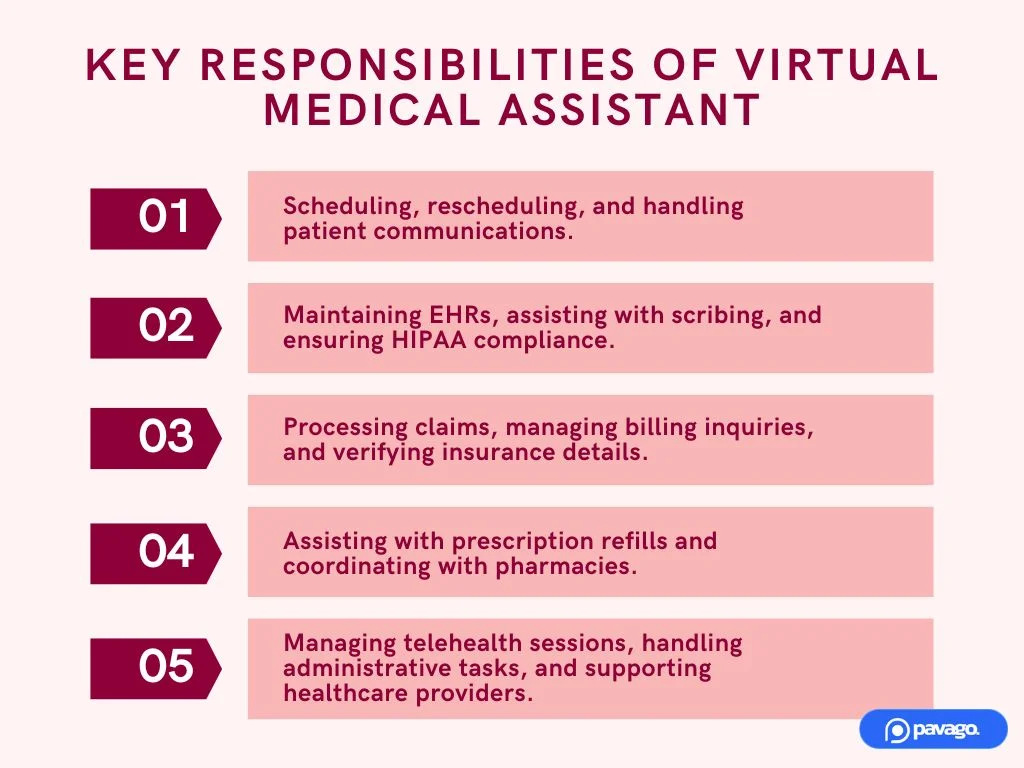
2. Cost-effective and Scalable Solution
One of the biggest benefits of hiring a virtual medical assistant is the cost savings. Traditional in-house staff come with overhead costs—office space, equipment, benefits, and more. Medical virtual assistants work remotely, and you only pay for the hours or services you need.
Many healthcare practices save up to 70% on labor costs by hiring overseas virtual assistants, making it a scalable option as your practice grows.
Hiring virtual medical assistants through Pavago is the best way to cut overheads and get access to the top global talent, available to join full time.
3. Keeping Up with HIPAA and Compliance
Healthcare practices must navigate complex regulations, including HIPAA compliance when outsourcing tasks. However, with the right processes and safeguards, you can ensure that your HIPAA-compliant virtual medical assistant maintains the highest level of data security.
HIPAA-compliant virtual assistants are trained in the nuances of patient confidentiality and secure data handling, giving you peace of mind that sensitive patient data is protected.
How to Hire a HIPAA-Compliant Virtual Medical Assistant
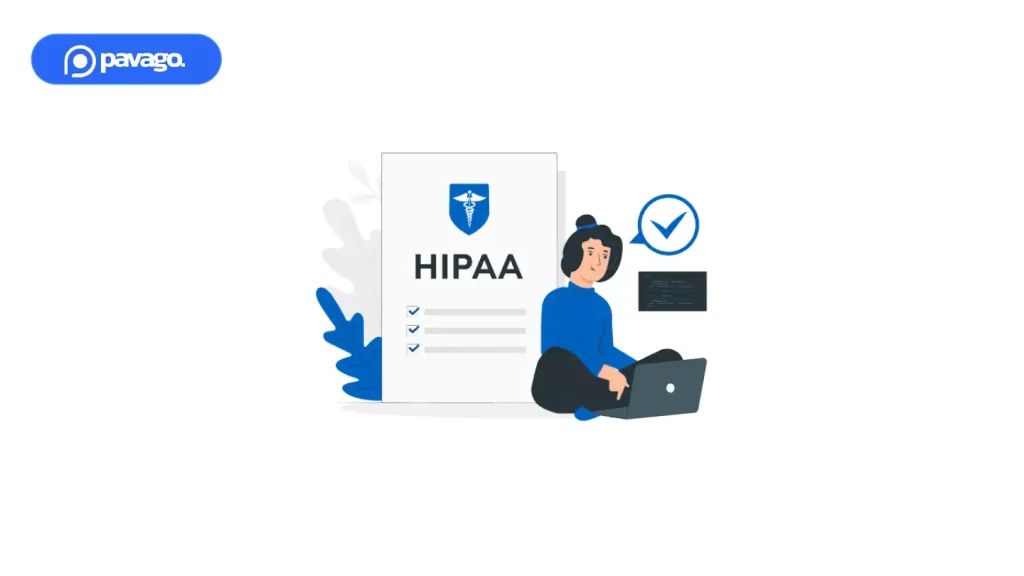
Hiring a HIPAA compliant virtual medical assistant that fits your practice’s needs and adheres to the stringent regulations in US healthcare requires a strategic approach. Here’s a step-by-step guide to ensure you hire the right virtual assistant.
1. Certifications and Qualifications to Look For
When you’re hiring virtual medical assistants, it’s essential to ensure they’re HIPAA-certified. This means they’ve been trained to handle patient information according to the standards required by US law. However, HIPAA compliance isn’t the only certification to consider.
Look for VMAs with experience in healthcare-specific tasks, such as:
- EHR (Electronic Health Records) management: Experience with systems like Epic or Cerner is a plus.
- Medical billing and coding: Knowledge of ICD-10, CPT codes, and familiarity with medical billing platforms like Kareo or AdvancedMD.
- Telemedicine support: As telehealth services grow, a virtual medical assistant who understands the nuances of virtual patient care and telemedicine platforms will become increasingly valuable.
💡 Pro tip: Ask for references from healthcare centers to ensure the virtual assistant has a proven track record of maintaining compliance and delivering high-quality work.
2. The Best Platforms and Agencies to Hire Virtual Medical Assistants
Numerous platforms and agencies source and hire healthcare virtual assistants. But not all offer the same services. You’ll have to vet your options based on how well they vet their candidates.
Some of the top platforms for hiring virtual medical assistants include:
- Pavago: An offshore recruitment company that specializes in hiring virtual assistants including IT, healthcare, and property management.
- Upwork and Zirtual: While these are general platforms, you can filter for healthcare-specific expertise and experience with medical billing, coding, and patient management.
3. Key Interview Questions for Virtual Medical Assistant
You wouldn’t hire a nurse or physician without first interviewing them—VMAs are no different. Beyond their certifications, it’s crucial to ask targeted questions to gauge healthcare knowledge when hiring a medical virtual assistant.
Here are some must-ask interview questions:
- What experience do you have with HIPAA compliance?
- Which EHR platforms are you familiar with?
- Can you walk me through a medical billing or coding scenario where you resolved a denied claim?
- How do you ensure patient confidentiality in a remote work setting?
You want someone who not only understands administrative tasks but also knows the ins and outs of healthcare-specific regulations.
Best Practices for Onboarding and Managing Your Virtual Medical Assistant

Hiring the right Virtual Assistant is just the first step. A smooth onboarding process ensures they can hit the ground running and seamlessly integrate into your practice.
1. Create a Healthcare-Specific Onboarding Process
Onboarding a Medical Virtual Assistant differs from integrating a general virtual assistant. Focus on training medical VAs in your specific workflows and systems. For instance:
- Familiarize them with your EHR systems and patient communication tools.
- Provide training on telemedicine protocols if applicable, especially for handling virtual consultations.
- Walk them through your billing and coding systems, ensuring they understand how to process claims accurately and efficiently.
2. Set KPIs and Regular Check-Ins
Setting clear performance metrics is crucial to managing your VA effectively. Common KPIs for a healthcare virtual assistant include:
- Accuracy of medical billing submissions (aim for less than 2% denial rate).
- Timeliness in managing appointment schedules and follow-ups.
- Secure handling of patient data, with no reported compliance issues.
- Incorporate regular check-ins, especially during the first 90 days, to ensure they’re adapting well to the workflows and are staying compliant with all healthcare regulations.
Common Challenges & Strategies to Manage Virtual Medical Assistants

Even with the best VMA on board, there will be challenges. But these can be easily mitigated with proper planning.
1. HIPAA Compliance and Data Security
One of the biggest concerns when outsourcing healthcare tasks is ensuring HIPAA compliance. Here’s how you can mitigate this risk:
- Ensure that all data transfers are encrypted using secure, HIPAA-compliant software.
- Implement VPNs and two-factor authentication to prevent unauthorized access to sensitive patient data.
- Regularly audit your VA’s work to ensure they’re following all compliance protocols.
2. Time Zone Differences
Companies often face communication challenges when they hire a Latin virtual assistant who lives in a different time zone, communication lags can occur. To avoid this:
- Use scheduling tools like Calendly or Google Calendar to manage availability.
- Set expectations early regarding working hours, especially for patient-facing tasks like appointment scheduling.
💡 Pro tip: It’s best to hire a medical virtual assistant who works in the U.S. time zone. Pavago has a pool of 30K+ exceptional candidates who prefer to work in EST.
The Future of U.S. Healthcare with Virtual Medical Assistants
The future of healthcare is increasingly digital, and hiring virtual medical assistants is the best way to support this transformation. As telehealth continues to expand and practices move towards value-based care, the administrative needs will grow even more complex.
Virtual medical assistants, with specialized skills in healthcare administration and HIPAA compliance, will continue to provide the much-needed support that medical practices require to keep up with these changes, at a fraction of the cost compared to traditional in-office staff.
Curious about how this could work for you? Let’s walk you through real success stories in healthcare.
Book a quick demo with our team and see how our top-tier offshore talent can seamlessly integrate into your team.
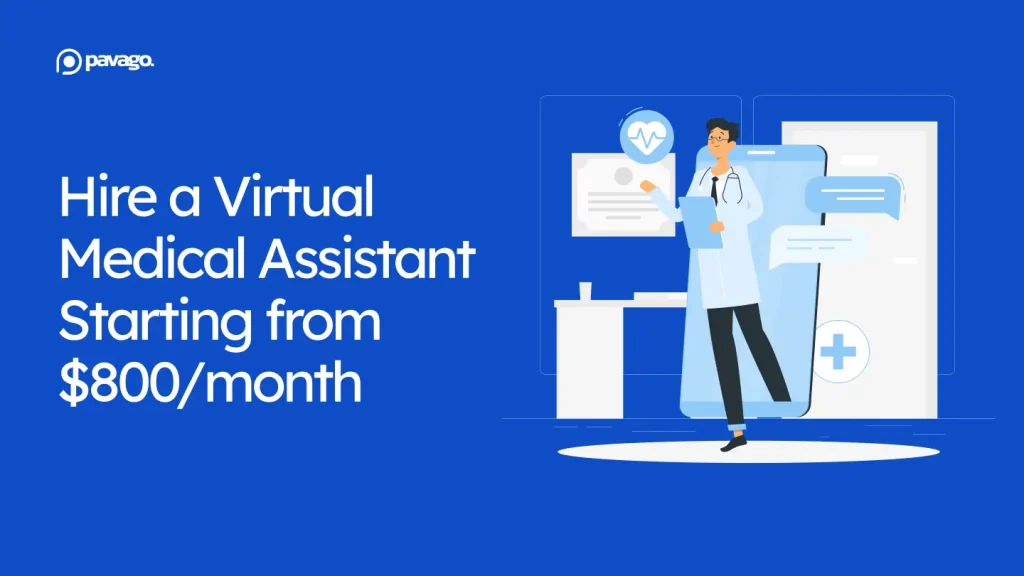






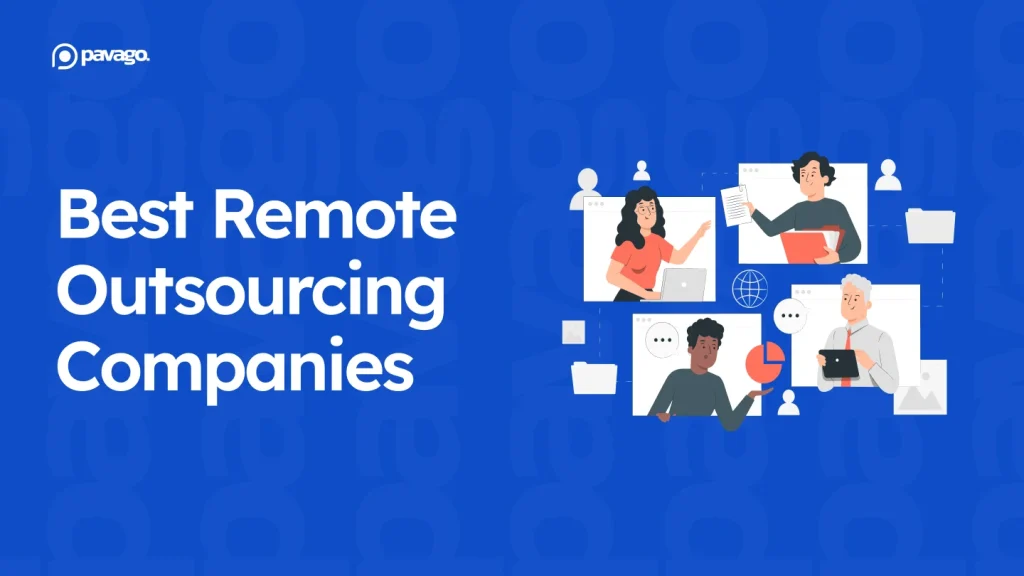
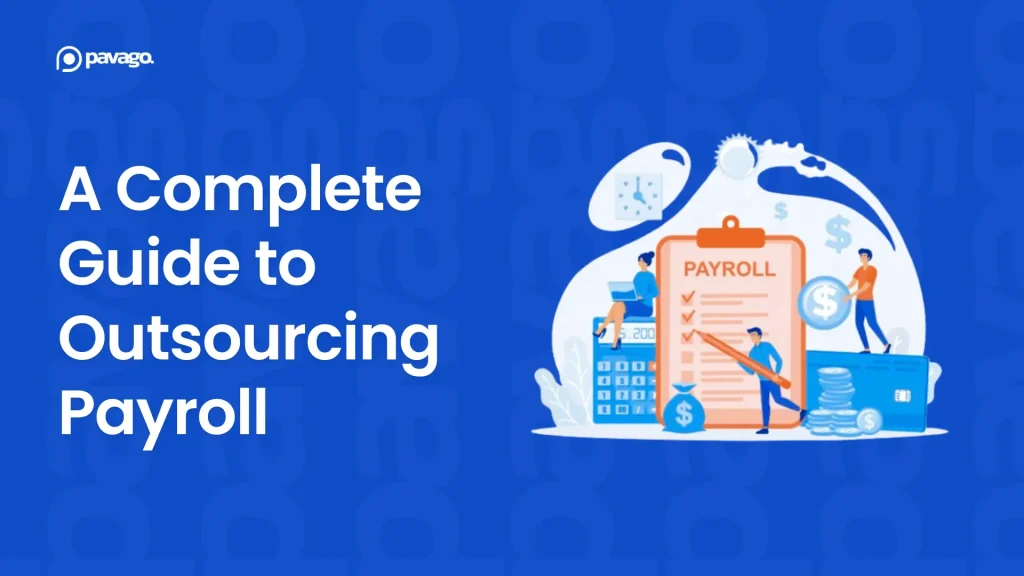
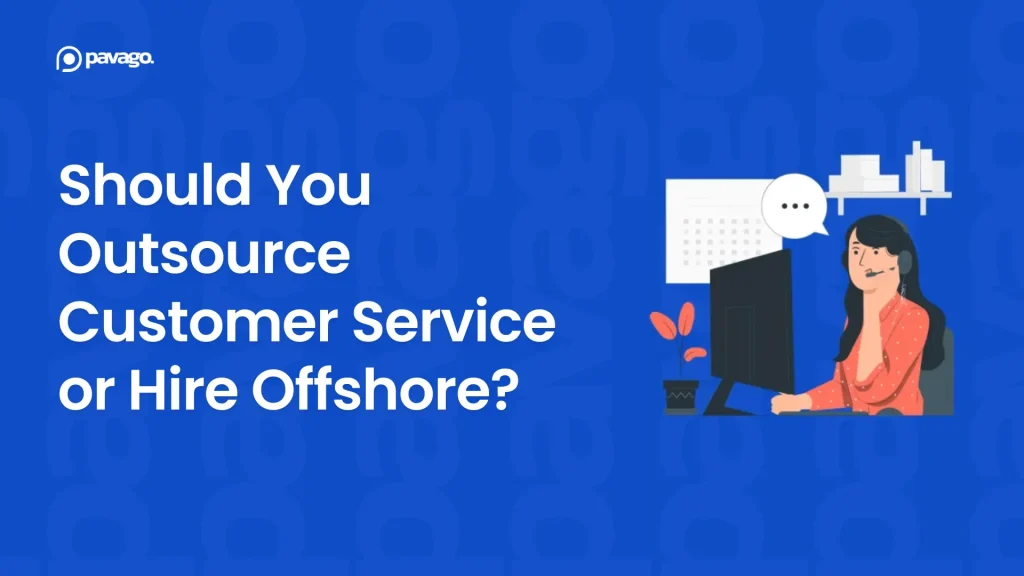
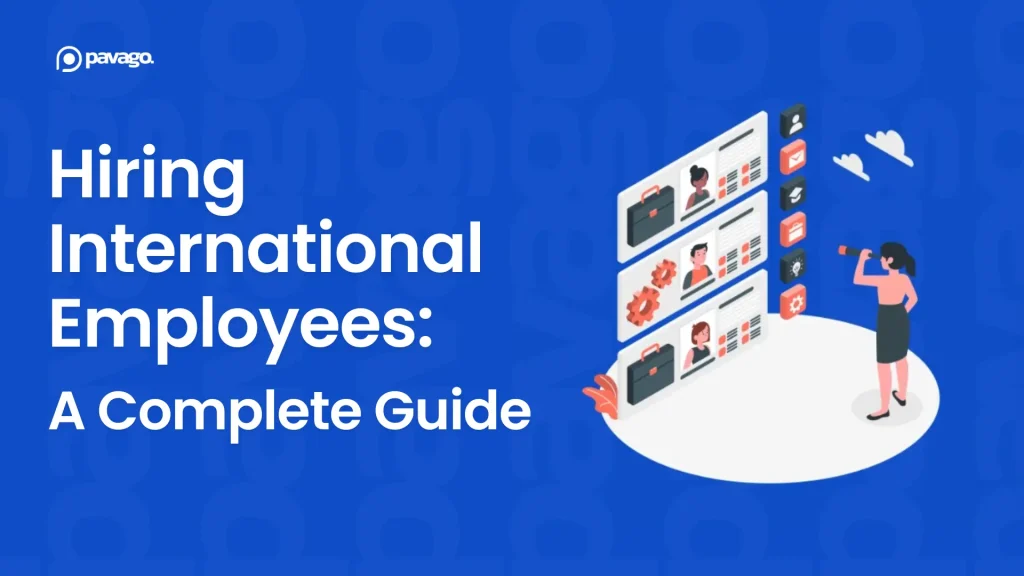
![Best BPO Companies in USA [2025]](https://blog.pavago.co/wp-content/uploads/2025/06/BPO-Companies-in-the-US-1024x576.webp)

